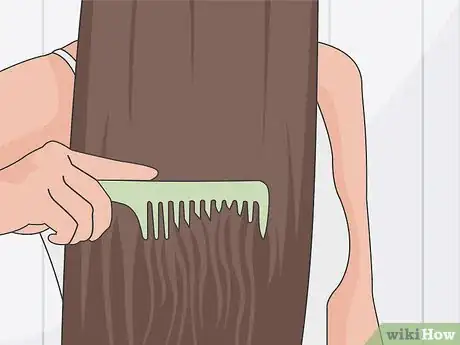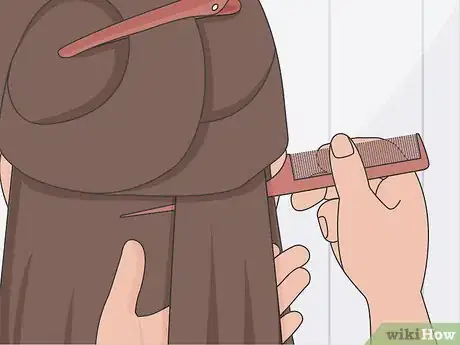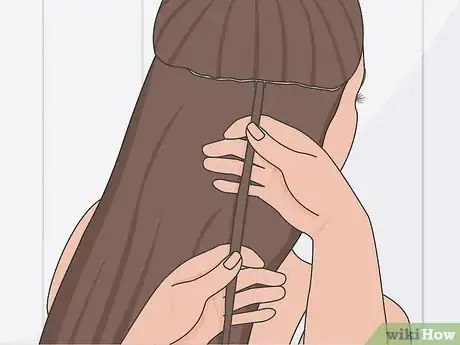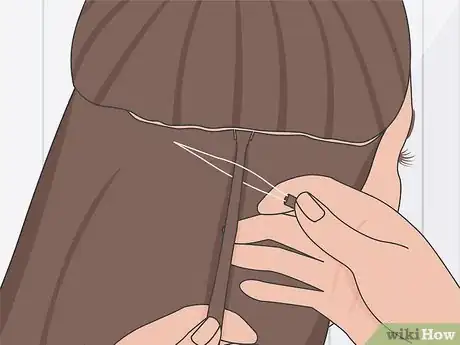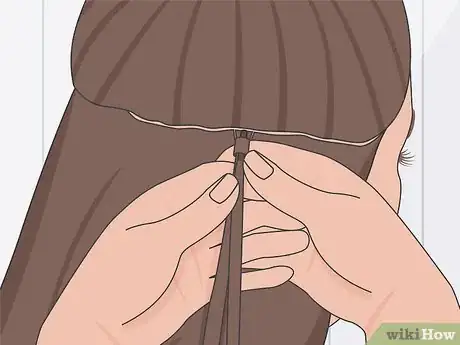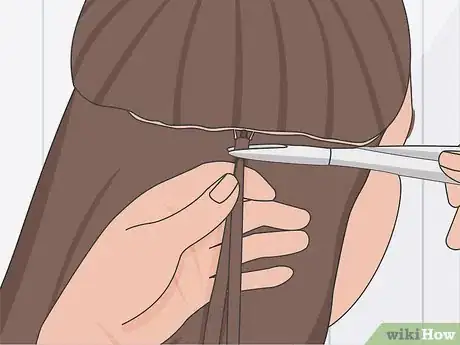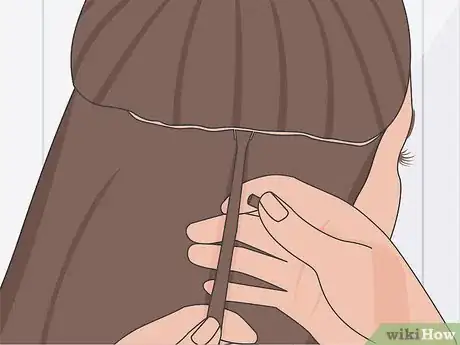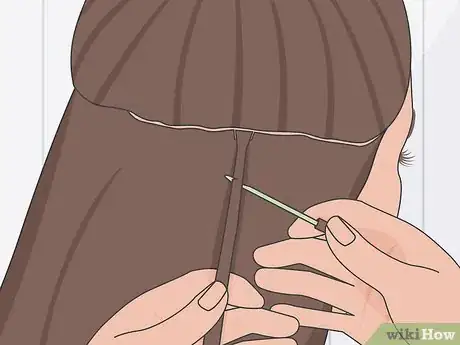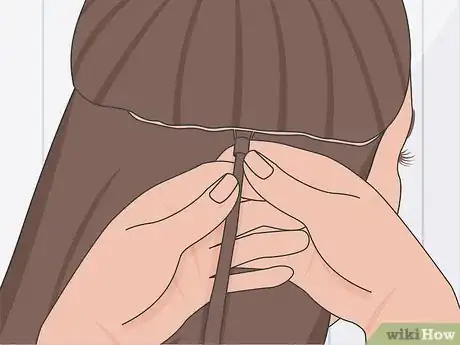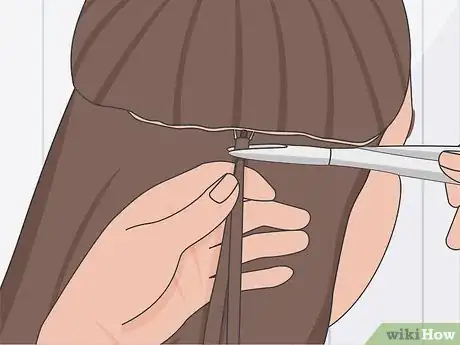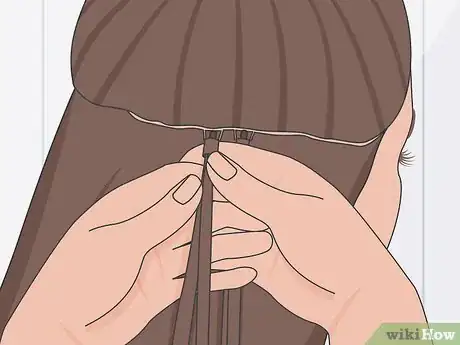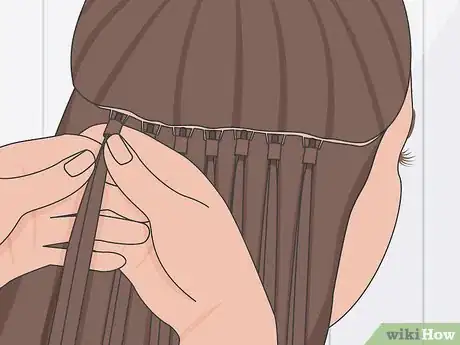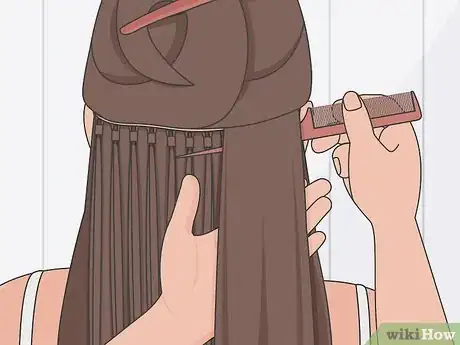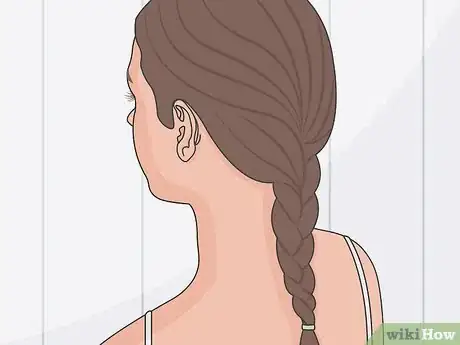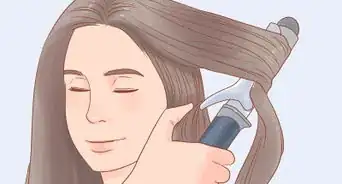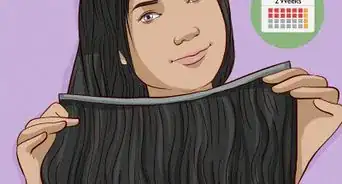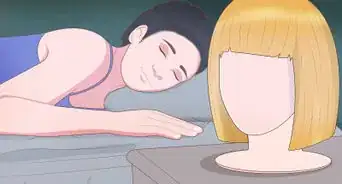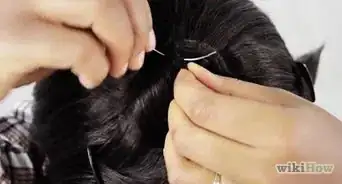This article was co-authored by Matt King. Matt King is the Director of Education at Fox and Jane Salon Group. With over 15 years of experience and expertise in cutting and coloring hair, he specializes in crafting trend-forward and technically savvy training and development materials for hairstylists. Matt received his cosmetology education from The Blaine Beauty School.
There are 14 references cited in this article, which can be found at the bottom of the page.
This article has been viewed 18,591 times.
Micro loop hair extensions are permanent hair extensions that you clamp near the roots of your natural hair using metal rings. These extensions come in 2 varieties: with loops and without. Micro ring hair extensions with loops allow you to pull your hair through the metal rings at the ends of the extensions without using a tool. Extensions without loops require a crochet hook to pull your natural hair through the rings. Luckily, the process is relatively simple regardless of what type of extensions you decide to use.
Steps
Sectioning Your Hair
-
1Start with clean, dry, straight hair. Shampoo your hair, but don’t use any conditioner if possible. Then blow dry your hair or allow it to air dry. If your hair is wavy or curly, straighten it when you blow dry it or use a flat iron before installing the extensions. This will make it easier to section your hair.[1]
- If your hair is unmanageable without conditioner, only use it at the ends of your strands. This will help to ensure that the roots of your hair won’t be slippery and will be easier to work with.
- If your hair is very curly and you cannot get it to stay straight, you may want to have a professional install your extensions.
-
2Comb your hair to remove all tangles. Pass through all of your hair with a wide-toothed comb or brush, and then switch to a fine-toothed comb to ensure that your hair is tangle free. If you locate any tangles while combing your hair, start combing near the ends to detangle your hair and move up the shaft as you work through the knot.[2]
- If you didn’t already use conditioner, spraying a leave-on conditioner may also be helpful if your hair is very tangled. Just make sure to apply it midway down the strand and below. Don’t apply it to the roots or it will be harder to install the extensions.
Advertisement -
3Divide your hair into 2 equal sections going from ear to ear. You won’t be adding extensions to the hair on top of your head, so it’s helpful to put it up. Secure the hair that’s on top of your head with an alligator clip, hair tie, or barrette to keep it out of the way. Then, secure the hair that’s leftover with an alligator clip.[3]
- Using an alligator clip will make it easier to undo your hair and pull out new sections of hair as you add the extensions.
-
4Comb out a section of hair 1 in (2.5 cm) above the nape of your neck. Use a rattail comb to create a straight line going across the back of your head. Comb through the hair again to remove any tangles.[4]
- If you want to start adding the extensions up higher, comb out a section from higher up, such as 2 in (5.1 cm) from the nape of your neck instead.
Tip: Position the extensions on the back of your head at least 1 in (2.5 cm) in from the hairline to blend them with your natural hair. Any closer to the hairline and they will be visible.
-
5Grasp a bundle of hair the same diameter as the extension. Select this hair from the top part of the section you combed out at the nape of the neck. Ensure that the first bundle you choose is at least 1 in (2.5 cm) in from your hairline. Use the pointed end of a rattail comb to gather this hair and detangle it again if needed. Hold one of the extensions next to your natural hair to check and then add or remove hair as needed to match them up.[5]
- If you have thick hair, this section may need to be smaller than if you have fine hair. Compare the hair to the extension to be sure.
- Extensions are available in different lengths. You can get extensions that are longer than your natural hair if you want to make your hair seem long as well as fuller, or choose extensions in the same length as your hair if you’re only trying to add volume.
Fitting Micro Ring Loop Extensions
-
1Slip your natural hair through the loop at the end of the extension. Micro ring loop extensions have a clear nylon thread loop and a metal ring attached to the top end of the extension. These two components work together to attach the extension near the root of your natural hair. The loop is wide enough to easily slip the section of your hair through it using your fingertips. Bring the loop up the length of the hair section until the ring at the top of the extension is about 1⁄2 in (1.3 cm) away from your scalp.[6]
- For best results, make sure that the extensions you’re using are made from 100% human hair. Synthetic hair looks unnaturally shiny and you cannot use heat styling tools on it.[7]
-
2Pull on the end of the loop to bring your hair through the ring 1⁄2 in (1.3 cm) from your scalp. Position the loop so it is on the side of the ring facing your hair. The end of the loop is located near the ring on the extension and pulling on it will bring your hair down through the ring. Position the extension about 1⁄2 in (1.3 cm) away from your scalp as you do this. Keep pulling until the entire section of your natural hair is through the ring.[8]
- Don’t let go of the ring as it is not yet secured to your natural hair.
-
3Clamp the ring with pliers to flatten it and secure it to your hair. Squeeze tightly to close the ring around your natural hair and make the ring lie flat. The rings bend easily with the pliers. Once you’ve flattened the ring, it will stay put where you attached it.[9]
Warning: Be careful not to catch your fingers or skin in the pliers as this will be painful.
Threading a Micro Ring Extension without a Loop
-
1Select micro rings that are close to the color of your roots. If your extensions did not come with micro rings, purchase them from a beauty supply store or online. Look for rings that match the color of your hair at the roots as closely as possible.[10]
- For example, if your hair is black, then opt for black rings. If your hair is light brown, go with light brown rings.
-
2Thread the hair through the metal ring using a size B-1 crochet hook. Insert the end of the crochet hook through the ring first. Then, grasp the section of hair with the hook about 1⁄2 in (1.3 cm) from the roots. Slide the ring upwards as you pull the hair downwards with the hook. Keep going until the entire section is through the ring.[11]
-
3Position the ring and extension1⁄2 in (1.3 cm) from the scalp. Slide the ring up towards the scalp until it is in this position. This is important so that the extension will lie flat. Otherwise, the ring may stick out from the scalp and be noticeable among your natural hair. Then, insert the end of the extension into the ring so that the extension is on top of your natural hair.[12]
- Placing extensions too close to your scalp can also cause pain and hair damage.
-
4Clamp down on the ring with pliers to close it and secure the extension. Place the pliers over the ring and squeeze until the ring is completely flat. This will secure it to your natural hair.[13]
- Make sure not to catch your fingers or skin in the pliers as this will hurt.
Did you know? Although micro ring extensions are considered permanent extensions, you can actually refit the ring by loosening it and moving the extensions closer to your scalp as your hair grows. Squeezing the ring with pliers on the sides will reopen the ring and loosen it.[14]
Completing the Installation Process
-
1Position the next extension 1⁄2 in (1.3 cm) from the first. Use a rattail comb to pull up a new section of hair the same size as the extension. Don’t place the extensions right next to each other or they will not blend in with your natural hair as well. Space them out so that there’s a section of hair without an extension attached to it between each of the extension sections.[15]
- Repeat this each time you add an extension.
-
2Continue to work across the row you have added the desired number of extensions. The number of extensions in each row will vary depending on how thick your natural hair is and how many extensions you decide to add. However, you may end up with about 10-20 extensions per row.[16]
-
3Comb out another 1 in (2.5 cm) section to add another row. After you complete the first row of extensions, unclip and comb out another 1 in (2.5 cm) section of hair above the first one. Use a rattail comb to ensure that the hair is parted from the rest of the hair in a straight line going from ear to ear. Then, clip the rest of the hair back up.[17]
- Work across this row in the same way as the first one, and then continue working across rows until you have added extensions to all of the hair in this section.
Tip: Remember to position the extensions at least 1 in (2.5 cm) inwards from your natural hairline. In other words, don’t place a hair extension right next to your ear, forehead, or neck or it will be visible.
-
4Care for hair extensions by keeping them clean, dry, and tangle-free. Shampoo and condition your hair extensions along with your natural hair 1-2 times per week. Use a blow dryer after washing your hair to dry them out, which may take longer than it takes to dry your natural hair since hair extensions are treated to hold in moisture. Put all of your hair into a loose braid or in a loose bun on top of your head before you go to bed to prevent the extensions from getting tangled.[18]
- Micro ring hair extensions require adjusting every 8-12 weeks, but the hair will last for years if you care for it properly.
- You should adjust your extension when it's around 1 1⁄2 to 2 in (3.8 to 5.1 cm) away from your scalp.[19]
Things You’ll Need
Sectioning Your Hair
- Shampoo
- Blow dryer and brush or flat iron
- Wide-toothed comb
- Fine-tooth comb
- Rattail comb
- Hair clips
Fitting Micro Ring Loop Extensions
- Fine-tooth comb
- Hair clips
- Micro ring loop hair extensions
- Pliers
Threading a Micro Ring Extension without a Loop
- Fine-tooth comb
- Hair clips
- Micro rings
- Crochet hook in the smallest size possible, such as a B-1 (2.25 mm)
- Hair extensions
- Pliers
Completing the Installation Process
- Rattail comb
- Alligator clips
References
- ↑ https://www.youtube.com/watch?v=zeZB_HT8jZI&feature=youtu.be&t=32
- ↑ https://www.youtube.com/watch?v=35B9TBLeq94&feature=youtu.be&t=25
- ↑ https://www.youtube.com/watch?v=35B9TBLeq94&feature=youtu.be&t=25
- ↑ https://www.youtube.com/watch?v=35B9TBLeq94&feature=youtu.be&t=25
- ↑ https://www.youtube.com/watch?v=35B9TBLeq94&feature=youtu.be&t=41
- ↑ https://www.youtube.com/watch?v=35B9TBLeq94&feature=youtu.be&t=120
- ↑ https://www.elle.com/uk/beauty/hair/a26212/hair-extensions-guide-reviews/
- ↑ https://www.youtube.com/watch?v=35B9TBLeq94&feature=youtu.be&t=140
- ↑ https://www.youtube.com/watch?v=35B9TBLeq94&feature=youtu.be&t=160
- ↑ https://www.youtube.com/watch?v=zeZB_HT8jZI&feature=youtu.be&t=75
- ↑ https://www.youtube.com/watch?v=zeZB_HT8jZI&feature=youtu.be&t=150
- ↑ https://www.youtube.com/watch?v=zeZB_HT8jZI&feature=youtu.be&t=240
- ↑ https://www.youtube.com/watch?v=zeZB_HT8jZI&feature=youtu.be&t=180
- ↑ https://www.elle.com/uk/beauty/hair/a26212/hair-extensions-guide-reviews/
- ↑ https://www.youtube.com/watch?v=35B9TBLeq94&feature=youtu.be&t=170
- ↑ https://www.elle.com/uk/beauty/hair/a26212/hair-extensions-guide-reviews/
- ↑ https://www.youtube.com/watch?v=35B9TBLeq94&feature=youtu.be&t=25
- ↑ https://www.realsimple.com/beauty-fashion/hair/how-to-take-care-of-hair-extensions
- ↑ Matt King. Director of Education, Fox and Jane Salon Group. Expert Interview. 31 August 2021.
- ↑ https://www.elle.com/uk/beauty/hair/a26212/hair-extensions-guide-reviews/

